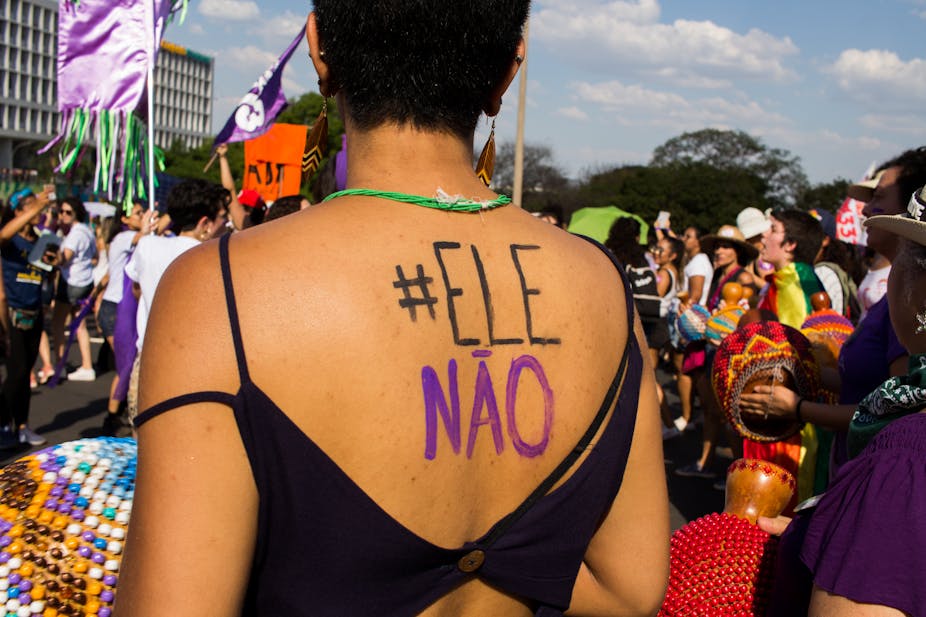Brazilian presidential candidate Jair Bolsonaro is well known for his inflammatory statements. He has publicly made misogynistic, homophobic, and racist comments. He also supports torture, and wants to reinstate the death penalty. A far-right member of the Social Liberal Party (PSL), Bolsonaro is currently leading the polls.
But there is vibrant opposition and resistance to his popularity. Movements have sprung up to ensure he never gets into office, one of which is Mulheres Unidas Contra Bolsonaro!!! (Women United Against Bolsonaro!!!). Restricted to those who identify as women, although solidarity from men is welcomed, this organisation – which uses a secret, closed Facebook group as its headquarters – has more than 3.86m members.
The group is aligned with the #elenão (#nothim) movement, which calls on Brazilian voters to cast their vote in the forthcoming presidential election based on morals, not politics. The movement has been criticised as being nothing more than a hashtag, or a “war of memes”. Yet #elenão, along with the related #elenunca (#neverhim) and #elejamais (also #neverhim) is active on all social networks, visible on the streets, and heard frequently as a chant, by people declaring their opposition to Bolsonaro. Among the group, there is firm belief that the movement directly helped prevent an outright win for Bolsonaro in the first round of presidential voting.
All this, even as the #elenão movement and its followers have been subject to a backlash of violence from pro-Bolsonaro supporters.
Since the first vote on October 7 2018, the election has become ever more divisive in Brazil. Many Brazilians I have spoken with are facing surprising divisions within their own families and social circles, leading them to ponder how Bolsonaro has such a strong support base. His supporters include evangelical Christians, Catholics, the wealthy, men, and people identifying as white. But he also tops the polls among women, and people identifying as black/brown.

Now, only the top two candidates remain in the presidential race. Due to go head-to-head in a second round of voting on October 28, Fernando Haddad, of the leftist Workers Party has been left standing against Bolsonaro. Initially the #elenão movement focused on “anyone but Bolsonaro”, showing no united support for any other specific candidate, and canvassing for other specific candidates was also forbidden. After the first vote results, however, many #elenão movement members regretfully announced they would vote for Bolsonaro in the second round – mostly due to discontent with the Workers Party’s previous performance while in power.
In response, the group refocused its methods, to actively campaign for Haddad, adding the hashtag #haddadsim to the group’s activity. Members are now announcing hourly how many votes they have converted for Haddad. But what kind of role might this movement play in the election? How likely is it to achieve its goal and prevent a Bolsonaro victory against the odds?
Changing voters’ minds
The main factors that generally influence voter choice are, from strongest to weakest: party identification, the economic performance of the sitting government, social identity, policy issues, and the personality of the candidate. This perhaps explains why there is support for Bolsonaro, to the extent that women who were actively against him are now opting to vote for him.
There is widespread anger towards and distrust of Haddad’s Workers Party, not helped by President Dilma Rousseff’s 2016 impeachment, along with President Michel Temer’s deeply unpopular austerity measures. So, as candidate personality has a much weaker influence on vote choice, despite Bolsonaro’s controversial remarks, voters still support him. They choose his party as an alternative to the PT, rather than vote against him based on his homophobic, misogynistic or racist comments. In other words, voters may be morally opposed to Bolsonaro, but support him from a political perspective.
So if politics has a stronger influence than morals on a person’s voting behaviour, can #elenão succeed? Studies show that political mobilisation messages, originating and occurring predominantly online, do work – but only to an extent. They affect voter behaviour by encouraging information seeking, and influencing political self-expression among voters with a weaker party identity. However, they are most effective in influencing friends, family members, and friends of friends within a group member’s social media circle. The influence is stronger between those that have offline relationships and face-to-face contact, even though it is the online activism and solidarity that is credited with initiating this social influence.
This is visible in the #elenão movement from members of the the Facebook group’s regular reports of converting votes, which I have tracked as far outweighing the initial members pledging to vote for Bolsonaro in the second round.

Every online post from a group member or supporter of how they have converted undecided or – for even more kudos – previous Bolsonaro supporters further encourages other women to share information and try to convert even just a single vote each. This could push Haddad to victory in the final vote. There is speculation that the final election result may hinge on the women’s vote, as women make up 52% of the Brazilian electorate. Unfortunately, this is a slim glimmer of hope. It is a tall order to convert enough votes to see Haddad emerge victorious. Bolsonaro still leads the polls by 59% to 41%, and is predicted to win in the second and final round of voting.
But whether it succeeds with its primary mission or not, this multi-million member transnational Brazilian women’s movement is extraordinary and nuanced, and has created a meeting point and planning headquarters for antifascist activism. There are plans to carry on as a solidarity and advocacy group, continuing to fight against the growing Brazilian alt-right that Bolsonaro’s campaign has revealed, regardless of the election outcome.
The slogan “not him” may need to be replaced after the election, but the sentiment and political agency that these women have harnessed is unlikely to go anywhere.

